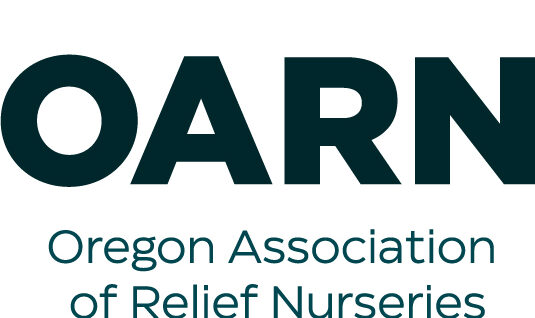By Nurture Connection
The Oregon Association of Relief Nurseries (OARN) knows that Early Relational Health (ERH) is the key to building strong families. The association includes 16 nonprofit nurseries at 38 sites across the state, who serve about 3,000 children annually. Through therapeutic classrooms, in-home visits, and parent education, Relief Nurseries support parents and caregivers as they raise the next generation.
Oregon’s Relief Nurseries — what OARN program director Amber Ziring calls the best-kept secret there is — focus on fostering the healthy development of children, strengthening the capacities of parents and caregivers, and supporting families navigating stress and trauma often as a result of systemic inequities. Relief Nurseries walk hand in hand with parents and caregivers as they navigate challenges and barriers, helping parents access their intrinsic relational capacities and strengths built through cultural and generational wisdom.
As part of Nurture Connection’s journey to learn what ERH looks like in the day-to-day realities of our network members, we have conducted listening sessions. In this recorded session with OARN, hear from association leadership as well as key staff at two Relief Nurseries in Oregon who discuss the work they do in the field. Major takeaways from the recording include active listening, being responsive, asking hard questions, and supporting parents and caregivers to arrive at the best course of action for parenting their children on their own terms.
In speaking with OARN, a core tenet of ERH was made clear — although it’s fundamental to listen to, nurture and care for children in these programs, it’s also essential to listen to, care for, and nurture parents and caregivers. As member of OARN and MountainStar Family Relief Nursery program director Tobiah Brown put it, everyone in the family needs to be loved on for this work to be a success.
And as Renee Smith, another member of OARN and executive director of Family Tree Relief Nursery, noted, program staff aren’t the “sage on the stage but the guide on the side.” Their role is to support caregivers with their caregiving capacity, advocate for their families, and source the parenting assistance and wraparound services they need.
Other elements of the discussion aligned with ERH’s core principles — parents frequently know what’s best for their children and simply require the guidance and resources to meet their needs. When they don’t have the answers, they need a trusted, nurturing relationship to help them figure out a plan, breaking big goals down into baby steps so they can be successful.
Smith shared, “It’s amazing what families can do when they’re supported.” The magic happens, say these practitioners, when parent-child relationships and connections are reinforced and nurtured, and caregivers are given the help, tools, and information that bolster their capacity and encourage their parenting wisdom for connection.
This blog is part of Nurture Connection’s “ERH in Action” series of listening and learning sessions. Our network is full of meaningful examples of people and organizations promoting ERH in their daily lives and work. Our new “ERH in Action” series highlights and uplifts stories from various fields to share learnings, challenges, and bright spots in the movement.
